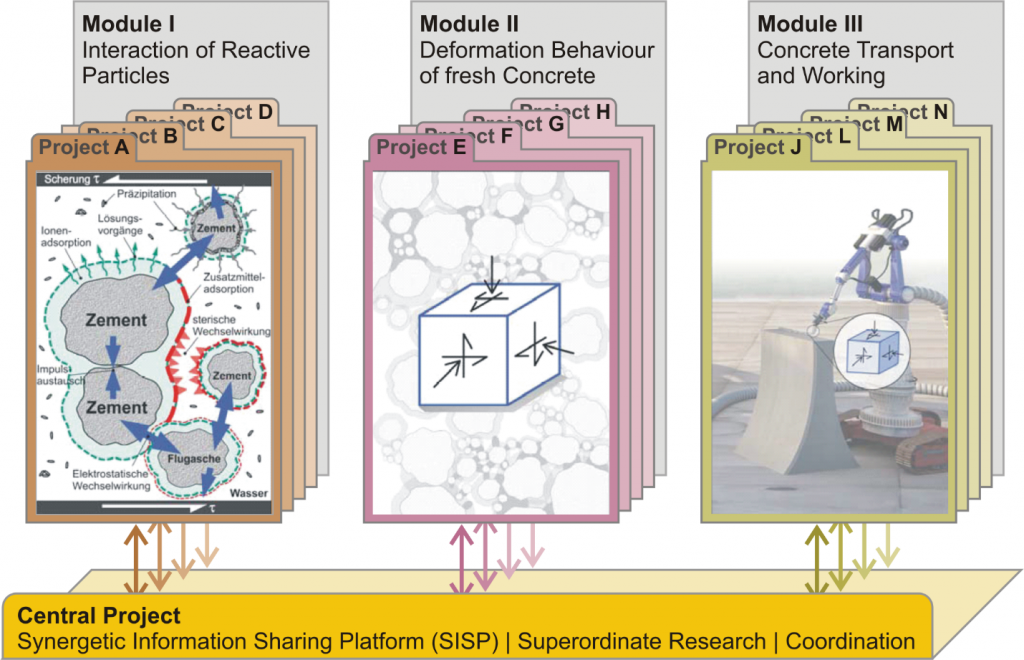1. Coordination and Synergetic Research in Priority Program 2005 OPUS FLUIDUM FUTURUM “Rheology of reactive, multiscale, multiphase construction materials”
Principal investigator(s) – PI
- Professor Dr.-Ing. Viktor Mechtcherine
Technische Universität Dresden, Institut für Baustoffe
Researcher(s) in charge – RI
1st phase
- Dr.-Ing. Egor Secrieru
Technische Universität Dresden, Institut für Baustoffe - Dr.-Ing. Venkatesh Naidu Nerella
Technische Universität Dresden, Institut für Baustoffe
2nd phase
- M.Sc. Irina Ivanova
Technische Universität Dresden, Institut für Baustoffe
Subject Area
Construction Material Sciences, Concrete Rheology, Pumping, Numerical Simulation of Fresh Concrete
Term
2017-2023
Project Identifier
Deutsche Forschungsgemeinschaft (DFG) – Projekt Nummer 313773090
Coordination Funds: Deutsche Forschungsgemeinschaft (DFG) – Projekt Nummer 387153567
Project Description
The goal of the DFG Priority Program 2005 is to ascertain and describe the scientific fundamentals for understanding and consecutively designing rheology-based construction processes as well as for developing innovative, sustainable building materials and associated pioneering processing technologies. The entire scientific spectrum related to the rheology of cement-based materials before hardening is to be included. Strong individual expertise in every single project of SPP 2005 is absolutely required. However, high surplus value can only be attained by close, well-organised collaboration within the priority program. Thus, the central goal of the coordination project is to create a favourable framework for the exchange of ideas and findings, for establishing strong interfaces among individual projects, for promoting joint, interdisciplinary research, and for cross-project evaluation and use of data. The resulting synergies will contribute decidedly to the lifting of SPP 2005 research to the desired level of outstanding international and national recognition. In achieving these ambitious goals, the coordination project includes both synergetic research and administrative/scientific coordination and research portions.
The synergetic research in the SPP 2005 will start with the choice of reference mixtures and substances, reference methods, standard procedures, and file formats of communication to facilitate the comparability of the observed results from among all the individual projects and to generate the synergistic exchange of relevant scientific information. As reference materials two cements and two high-range water-reducing admixtures (HRWRA, known as superplasticizers) will be purchased by the coordination project in such amounts that all participants are supplied for performing their experiments with these mandatory substances. The core of the so-named Synergetic Information Sharing Platform (SISP) will be a joint data bank run by the coordination project. Purposeful triggering of coordinated research activities, control of deliverables and steering scientific discussions will provide surplus for the individual projects and for the SPP 2005 as a whole. These necessary measures are only reasonably implementable in conjunction with each participant’s own interdisciplinary research within the coordination project by superordinate evaluation of generated data with the goal of developing a generalised approach to rheology-motivated/rheology-enabled, cement-based material design.
The continuous scientific coordination will be based on the objectives and structure of the priority program as formulated in the application for establishing said priority program. Administrative or, more correctly, organisational activities are needed to support directly scientific exchange, collaboration within the priority program and scientific growth of the young researchers involved. Aside from everyday communication by means of telephone conferences and e-mails, numerous focused events such as working meetings, workshops, summer schools, scientific conferences and round-robin tests will be organised by the coordinator and his team. Moreover, the mobility of young researchers and small sub-projects will be strongly fostered and the access to special, external high-end measurement techniques will be enabled by means of a special funding pool. Finally, an important objective of the central project is the dissemination of the results obtained, both within the scientific community and, using popular scientific means, to the public at large.

Publications
Data in Brief 27 (2019)
Data in Brief 30 (2020)
Data in Brief 31 (2020)
Data in Brief 39 (2021)
Materials and Structures 53 (2020)
Frontiers in Materials 144 (2022)
Presentations
Priority Program DFG SPP 2005 – Rheology of reactive, multiscale multiphase construction materials
International RILEM Workshop on Rheological Measurements of Cement-based Materials | Arras, France (2018)
Priority Program DFG SPP 2005 – Rheology of reactive, multiscale multiphase construction materials
27. Konferenz “Rheologische Messungen an mineralischen Baustoffen” | Regensburg, Germany (2018)
